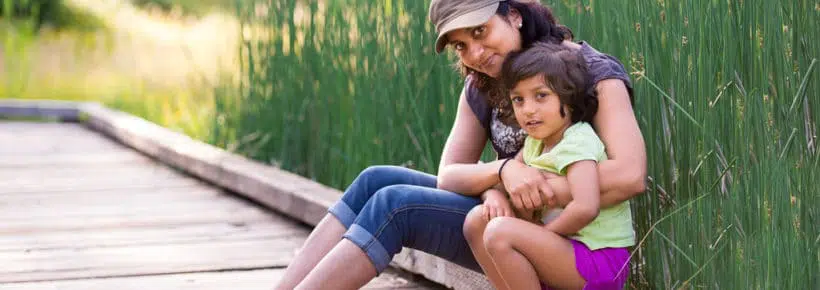In the Gospel of Matthew, Jesus said to His disciples, “Let the children come to me, and do not prevent them; for the kingdom of heaven belongs to such as these.”
Our calling as Catholic parents is to take Jesus’ words to heart and not only teach our children about Him but give them the tools they need to choose to follow Him as they grow into adults.
As today’s parents know, this is not easy. Parenting has never been easy, but the challenges of today’s world make it even more difficult, as we face struggles that parents 20-30 years ago or longer could not imagine. The predominance of social media, the ubiquity of phones, and the ever-present culture of death in classrooms and on TV attempt to sway our children to secular beliefs. Parents must constantly compete with outside influences for their children’s time and attention.
To make matters worse, with the rising cost of food, housing, and gas, two-parent families often have no choice but to both work. These struggles can be staggering for single-parent families.
What is a Catholic parent—married or single—to do? How can we help our children navigate the world so that they choose Christ over the lures of the secular world?
We start when they are newborns and work daily to show them their value as human beings and the beauty of Catholicism.
Types of Parenting
The Catechism of the Catholic Church teaches that “parents must regard their children as children of God and respect them as human persons.”
Yes, we begin by respecting our children as persons. If we want them to respect us and other people, we must model that same respect. That doesn’t mean we allow them to get their way all the time, but we listen to them. We talk with them. We help them make good decisions. We show them that they matter and are an integral part of the family. These are some of the principal actions an authoritative parent takes.
In the 1960s, a developmental psychologist named Diana Baumrind studied families and parenting techniques. From these studies, she identified three different parenting styles: permissive, authoritarian, and authoritative. Permissive parents either do not want to or cannot set limits. Authoritarian parents make demands of their children; they simply want obedience to their rules. But authoritative parents are the ones who teach and discipline with kindness. They talk with their children and speak with love.
Baumrind found that children of the first two styles of parenting developed behavior problems, self-esteem issues, and were more likely to get into trouble. But children of authoritative parents were typically well adjusted and happy. As a result, she determined that this is the preferred style of parenting.
What does this look like in real life?
Authoritative parents respect their children and set boundaries. They talk to them and consider their feelings and thoughts. They explain that rules are set and meant to be followed for the children’s own good. Authoritative parents spend quality time with their children. They teach about morals and expect the children to follow the rules. Natural consequences are given when children break the rules.
All of this results in children who feel valued and cherished. This is how parents help their children establish trust.
Along with these feelings of trust, children must know that their home is a safe place—a place where, when they do something wrong, they will learn from their mistakes rather than be shamed or hurt in some way.
Discipline
Parents often lament that their children don’t come with instruction manuals. It’s hard to know what to do in every situation that could arise. But when it comes to discipline, the best course of action is gentle discipline—discipline that teaches rather than shames. Depending on the personality of the parent, it may take some effort and patience, but if we try to live by Jesus’ words “Do to others as you would have them do to you” we will know how to act.
How we form our children sets them up for how they treat others, how they view the world, and how they look at their spiritual Father in heaven. When children misbehave or break the house rules, it’s a parent’s job to determine a punishment that naturally follows and to explain the consequences.
For example, if your sons are throwing the football around in the house after you have told them not to, and they break a statue, it might feel natural to yell and send them to their rooms. But that does not teach them responsibility or ownership of their behavior. Instead, first ask if they are okay and unhurt. That shows your concern for their well-being. Then have them clean it up. If the statue is broken in only a couple pieces, have them help you try to glue it back together. If it’s shattered, have them sweep it up. Then explain that it was a special statue, that they disobeyed by not listening, and that they must pay for a new one. Ask them to apologize and then have them shop for a new one with you.
Natural consequences are key. If your teenager breaks curfew, take the car keys for a period of time. If your child is not doing homework because he wants to watch TV or play on a device, restrict the use of the devices until all the homework is finished. Understanding that their behaviors have certain outcomes will help your children make better decisions.
One of the most controversial parenting behaviors is spanking; new parents often want to know if it’s okay to spank a child. It’s common to hear people say, “I was spanked, and I turned out okay” or “I learned respect because my father spanked me.” We must remember that correlation does not equal causation. And while a light spanking, depending on the age of a child, may be effective in getting their attention or stopping a bad behavior in a dangerous situation, it’s always a better practice to find another way to deal with your child’s misbehavior. Hitting a child doesn’t teach them a lesson or explain why their behavior was wrong.
Likewise, time outs can be equally ineffective. While sometimes a child needs a quiet space after a fight with a sibling or something similar, most children will just sit in a time out thinking mean thoughts about the parent. It’s much more effective to teach children that their actions have natural consequences and that they have to take responsibility for their behavior.
Alternatives to Screen Time
Parents today battle the proliferation of screens and 24/7 videos. Give a kid an iPad or a smart phone, and he will sit and play all day. While devices may be helpful in keeping a child’s attention as you get dinner ready, the damaging effects of excessive screen time have been well documented. Kids’ attention spans are shorter, and they are exposed to mature content well before the proper age. Further, according to an article on the NIH website, “Excessive screen usage has detrimental effects on social and emotional growth, including a rise in the likelihood of obesity, sleep disorders, and mental health conditions including depression and anxiety. It can obstruct the ability to interpret emotions, fuel aggressive conduct, and harm one’s psychological health in general.”
Simply put, it is not healthy for a child of any age to spend hours each day on a phone, an iPad, or watching TV. Children of all ages need parental interaction, not a 2D screen to fill their minds.
Fill your house with puzzles, books, toys, board games, arts and craft supplies, and sports equipment. My sons loved these little plastic Football Guys (yes, that was their actual name) and would spend hours with them. The same company has Baseball Guys, Hockey Guys, and more. They would also play for hours with Playmobils. These types of toys engage their imaginations and are so much healthier than staring at a screen.
Kids also need their parents to be active in their lives. Go hit balls with your children, play games, or break out the Play-Doh. Put some music on and dance. Read to them from great Catholic books. The possibilities are endless.
Education
When it comes to school, parents have many options to choose from: homeschool, private school, Catholic school, or public school. All have benefits and drawbacks. Parents must determine which is right for each child.
Regardless of where your children go to school, they need Catholic education in the home. There are many ways to help children grow in the faith, and from the time they are small, we must teach them the beauty of Catholicism, and we must help them see that we care about their souls.
Even if you send your child to a Catholic school, you must teach the faith at home. That means adding Catholic education to your evenings and weekends in fun and engaging ways. Programs like the Culture of Life Studies Program offer Catholic, pro-life materials for homes and schools and can be taught by anyone. Likewise, Holy Heroes offers books and other resources for homes. Instead of secular books, add books about the saints by Catholic authors such as Maria Riley or books from Pauline Media to your home library.
When your children are small, read these books aloud to them. Then have discussions. Ask their thoughts and opinions. Let them express their feelings and ask questions. Help them get to know and love God. The goal is to help your child develop a relationship with Christ when they are little so that they feel comfortable in that relationship later in life.
Older kids likely still want to have discussions, though parents need to be a bit more pragmatic about them. Teens will sometimes feel “pushed” into religion, and often that’s because they don’t understand it or they are listening to what the secular world has told them.
The noise from outside can be incredibly loud. Combating it takes effort. Whether you have been educating your child in the faith all along or whether you are late to the table, there are many things you can do to educate. Begin by praying as a family. Discuss the importance of prayers. Share times when your prayers have been answered and even times when they have not been. Explain that sometimes a no from God or even a not yet is really the best answer.
Listen to Catholic podcasts with your teens. Life Teen has a list of several good ones. Likewise, get your children involved with Life Teen or a youth group at your parish.
Watch TV shows like The Chosen. It’s not Catholic, and it does take liberties at times, but the love of Christ shines through, and it will engender many conversations.
Eat a family dinner as many nights a week as your schedule will allow. Make this a no-phone zone. Tell your children that you want to see their beautiful faces, hear about their days, and talk.
As children grow older, you will have conversations about increasingly difficult topics. Teaching kids about sex will be one of them. It’s hard to suggest the age at which a teen is ready to date, but setting some ground rules is vital. Talk about chastity. Make sure your children know that they are gifts and that their bodies are gifts. Encourage them to hang out with friends in groups rather than date. Once they get a bit older, suggest fun dates like miniature golf or a movie. If your child becomes serious about someone, tell them you want to meet this person. Invite him or her over and have frank discussions about what you expect and what you see.
If you find it difficult to talk about sexuality or don’t know what to say, consider using a Theology of the Body program at home. TOB comes from Pope John Paul II’s Wednesday audiences from September 1979 through November 1984. During those talks, he spoke about the unique and holy love between a man and a woman. Because these teachings are so beautiful, they are now available for all ages.
You can introduce TOB to little ones with Jesus Had a Body Like Me: A Theology of the Body for Babies and Little Ones, which teaches “forgiveness, kindness, gift of self, and authentic love.”
As kids grow, you can use The Body Matters for kids in pre-K-8th grade. For middle school children, there’s a great new program created by Ascension. Called Envision: Theology of the Body for Middle School, this program “delivers the insights of TOB on a young person’s level and helps middle schoolers answer some of life’s deepest questions: Who am I? Where am I going? How should I live to get there?”
Programs like these help parents address the tough questions of today with their children without being confrontational and are great guides for tough discussions.
Parents must also be good models of faith. That means never missing Mass (unless you’re sick). It means talking about the sacraments and going to confession regularly. It means teaching about the real presence of Jesus in the Eucharist. It means family prayer time, befriending the saints, going to Adoration, and reading Bible stories.
It is crucial to make faith a normal part of life, not something acted upon one hour on Sunday mornings.
Saintly Role Models
Look around the world today and you will see “influencers” who want to be role models. More than likely, these people will only cause harm.
That’s why it’s important to introduce saints to your children. Saints will help your child navigate the world, know the right response in difficult situations, and help strengthen their relationship with Christ. These are the influencers Catholic parents should strive for.
There are many awesome saints to choose from. But one you will absolutely want to mention is Blessed Carlo Acutis, who will be canonized next year as the first Millennial saint. Carlo died from a brief illness in 2006 when he was just 15 years old, but the life he lived served as an example to everyone who knew him. Numerous books for all ages have already been written. A quick google search will help you find the appropriate one for your child.
Another remarkable saint is St. Tarcisius, who loved Christ in the Eucharist so much that he died protecting Him.
Saints like John Bosco, Therese of Lisieux, and Josephine Bakhita all have amazing stories that will resonate with children of all ages.
Just as children need the example of saints, parents often need the guidance and inspiration of saintly parents or saints who understood the beauty of family and children.
Parents, especially those whose children have left the faith, can pray to St. Monica. She understood the heartbreak of having a child walk away from the faith. She prayed for nearly 20 years for Augustine. He finally returned to the faith and is now known as one of the greatest minds of the Church.
Parents can also pray to St. Elizabeth Ann Seton, who understood the importance of educating children, to St. Gerard, who is the patron saint of mothers, to St. Nicholas of Myra, who is the patron saint of children, and to St. Charbel Makhlouf, who was a monk and a hermit, but who from a young age was known for his piety.
Additionally, Saints Louis Martin and Zélie Guérin were the parents of St. Therese of Lisieux and lived a beautiful example of saintly parenthood.
These and all the other saints in heaven love your children and will pray for you and your family if you seek their intercession.
Final Thoughts
Parenting is hard. Catholic parenting in a secular world is even harder. Pray daily for guidance and understand that you don’t have to be perfect. We all make mistakes. If you mess up and hurt your child somehow, ask her for forgiveness.
As you work to encourage your child to grow in the faith, make sure that you take care of yourself and your own spiritual life. Allow your child to see you pray, to go to Adoration, to read holy books, and to live your faith openly. Not only will these actions increase your faith, but modeling them will strengthen your children’s faith.
Finally, know that God loves your child even more than you do, even though that may seem impossible. He holds them in the palm of His hand, just as He holds you. He wants you to trust in Him so He can welcome you all into the kingdom of heaven.
Related Content
Susan Ciancio has a BA in psychology and a BA in sociology from the University of Notre Dame, with an MA in liberal studies from Indiana University. Since 2003, she has worked as a professional editor and writer, editing both fiction and nonfiction books, magazine articles, blogs, educational lessons, professional materials, and website content. Fourteen of those years have been in the pro-life sector. Currently Susan writes weekly for HLI, edits for American Life League, and is the editor of its Celebrate Life Magazine. She also serves as executive editor for the Culture of Life Studies Program, an educational nonprofit program for k-12 students.



























What a beautiful well spoken article. So many of these suggestions can apply to children or a family of any age or stage of life. Being a parent never changes even as your children get older . We still have the same fears , joys, and worries. Having faith and Christ in your life can help you when things seem out of your control. Turn back to God and he will guide you. Even in this ever changing world. T
Beautiful Susan.
What a beautiful article!! There are so many resources and great tips for raising little ones. My kids are all young adults now and when they have children someday they will be challenged just like what Susan wrote about. I’m saving all those old toys that you need your imagination to play with and their old books that I loved reading to them. I love the suggestions of books also and will remember those along with my old ones. Thanks for all the tips and tools to raise children in the right path.
“Direct your children onto the right path,
and when they are older, they will not leave it.”
Proverbs 22:6